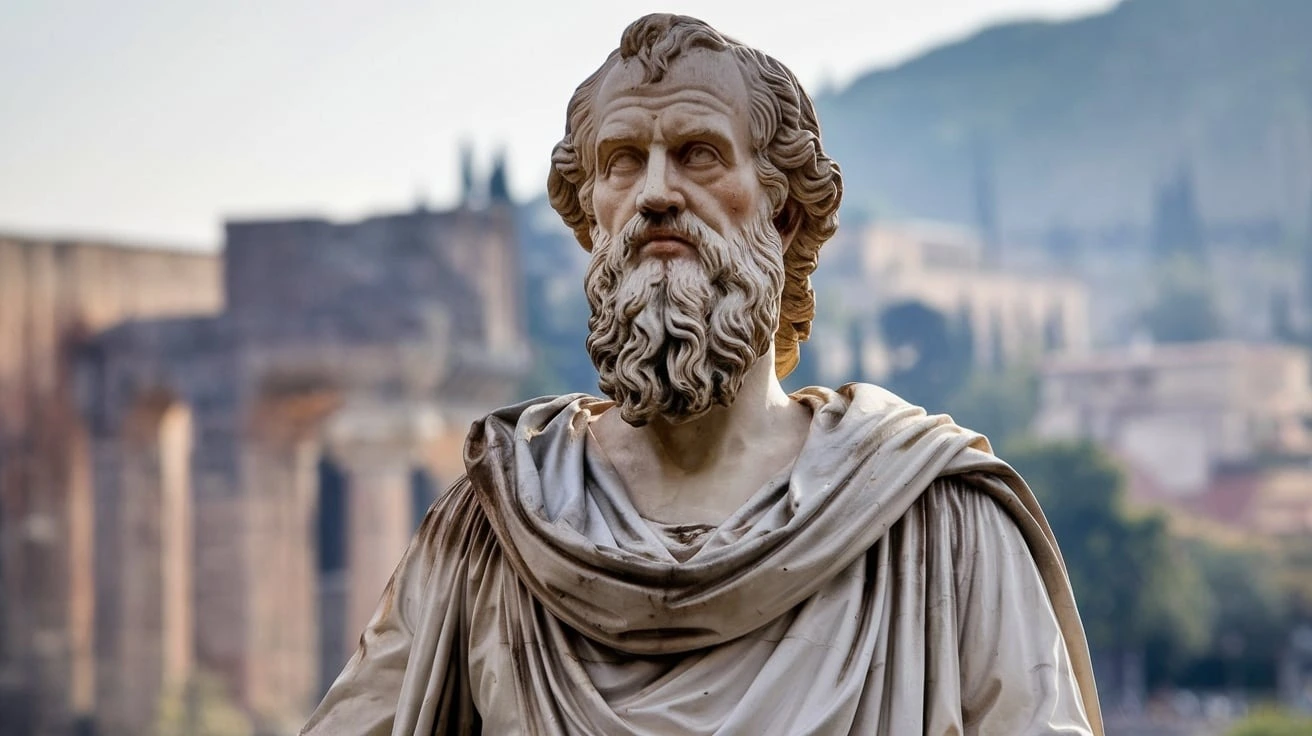Here are some of his most impactful Pythagoras Quotes, each reflecting his wisdom and beliefs.
Pythagoras, the ancient Greek philosopher and mathematician, is best known for his contributions to mathematics.
His thoughts on mathematics, ethics, and the nature of existence continue to resonate through the ages.
On Mathematics and Philosophy
“Numbers are the highest degree of knowledge. It is knowledge itself.”
Arthur: Pythagoras
Description:
Pythagoras viewed numbers as fundamental to understanding the universe, equating them with the highest form of knowledge and insight.
“The more we know, the more we realize we know nothing.”
Arthur: Pythagoras
Description:
This quote highlights the paradox of knowledge; the pursuit of understanding often reveals the vastness of what remains unknown.
“Everything is a number.”
Arthur: Pythagoras
Description:
Pythagoras believed that numbers and their relationships are fundamental to all aspects of reality, implying that mathematical principles underpin the nature of existence.
“There is geometry in the humming of the strings; there is music in the spacing of the spheres.”
Arthur: Pythagoras
Description:
Pythagoras emphasized the harmony between music and mathematics, suggesting that both are interrelated and fundamental to understanding the cosmos.
“The right angle is the most important angle in the universe.”
Arthur: Pythagoras
Description:
This quote reflects Pythagoras’s belief in the fundamental importance of geometry, particularly the right angle, in understanding spatial relationships.
“Wisdom is the principal thing; therefore get wisdom: and with all thy getting get understanding.”
Arthur: Pythagoras
Description:
Pythagoras underscored the importance of acquiring wisdom and understanding as the foundation of a meaningful and enlightened life.
“Harmony is the essence of the universe.”
Arthur: Pythagoras
Description:
This quote reflects Pythagoras’s belief in the inherent harmony present in the natural world and the cosmos.
“To know thyself is the beginning of wisdom.”
Arthur: Pythagoras
Description:
Pythagoras believed that self-knowledge is the first step towards attaining true wisdom and understanding of the world.
“The soul is immortal and its experiences in this world are part of its eternal journey.”
Arthur: Pythagoras
Description:
Pythagoras’s philosophy included the belief in the immortality of the soul and its ongoing journey through different lifetimes.
“He who learns but does not think is lost. He who thinks but does not learn is in great danger.”
Arthur: Pythagoras
Description:
Pythagoras emphasized the importance of both learning and critical thinking as essential components of true knowledge and wisdom.
On Ethics and Behavior
“Do not say a little in many words but a great deal in a few.”
Arthur: Pythagoras
Description:
Pythagoras advocated for brevity and conciseness in communication, valuing the ability to convey significant meaning with few words.
“Be silent or let thy words be worth more than silence.”
Arthur: Pythagoras
Description:
This quote underscores the importance of speaking thoughtfully and ensuring that words have meaningful value.
“The unexamined life is not worth living.”
Arthur: Pythagoras
Description:
Pythagoras emphasized the necessity of self-reflection and examination as central to living a fulfilling and purposeful life.
“A fool does not heed the wisdom of the elders.”
Arthur: Pythagoras
Description:
This quote reflects Pythagoras’s respect for the wisdom of the experienced and the importance of learning from those who have greater knowledge.
“Avoid that which is bad and harmful to yourself and others.”
Arthur: Pythagoras
Description:
Pythagoras’s ethical teachings included the principle of avoiding actions that are detrimental to oneself or others, promoting moral integrity.
“The best way to predict the future is to create it.”
Arthur: Pythagoras
Description:
Pythagoras believed in the proactive role individuals play in shaping their destinies, emphasizing the power of action in determining the future.
“The greatest wealth is to live content with little.”
Arthur: Pythagoras
Description:
Pythagoras valued contentment and simplicity, suggesting that true wealth comes from living a modest and fulfilling life.
“Practice justice, and be kind, to attain the ultimate goal of life.”
Arthur: Pythagoras
Description:
Ethical behavior, including justice and kindness, was central to Pythagoras’s philosophy as the path to achieving life’s ultimate purpose.
“To act with virtue is to live by nature.”
Arthur: Pythagoras
Description:
Pythagoras believed that living virtuously meant aligning one’s actions with the natural order and principles of the universe.
“The good man is the friend of all men.”
Arthur: Pythagoras
Description:
Pythagoras’s ethical teachings included the principle of universal friendship and the importance of being a friend to all.
On Nature and the Cosmos
“Nature is a mutable, ever-changing, and all-encompassing entity.”
Arthur: Pythagoras
Description:
Pythagoras recognized the dynamic and transformative nature of the universe, emphasizing its continuous state of change.
“The cosmos is a harmonious whole; its parts are interconnected and interdependent.”
Arthur: Pythagoras
Description:
Pythagoras’s view of the cosmos was that of an interconnected and harmonious system, where all elements are interrelated.
“The stars are the messengers of divine order.”
Arthur: Pythagoras
Description:
This quote reflects Pythagoras’s belief in the divine order and the significance of celestial bodies in the structure of the universe.
“The essence of the cosmos is rhythm and balance.”
Arthur: Pythagoras
Description:
Pythagoras viewed rhythm and balance as fundamental principles governing the nature of the universe.
“All things are in a state of flux, yet there is an underlying harmony.”
Arthur: Pythagoras
Description:
This quote captures the idea that while everything in the universe is constantly changing, there is a deeper, underlying harmony.
“The cosmos speaks through numbers and proportions.”
Arthur: Pythagoras
Description:
Pythagoras believed that the language of the universe is expressed through mathematical principles and proportions.
“The order of the universe reflects the order of the soul.”
Arthur: Pythagoras
Description:
Pythagoras saw a reflection of cosmic order in the soul, suggesting that understanding one leads to understanding the other.
“The study of nature reveals the divine truth and harmony of existence.”
Arthur: Pythagoras
Description:
Pythagoras believed that examining the natural world provides insights into the divine and harmonious nature of existence.
“The harmony of the spheres is the music of the universe.”
Arthur: Pythagoras
Description:
This quote reflects the belief that the movements of celestial bodies create a form of cosmic music, embodying the harmony of the universe.
“The universe is a reflection of the divine order and beauty.”
Arthur: Pythagoras
Description:
Pythagoras viewed the universe as a manifestation of divine order and beauty, revealing deeper spiritual truths.
On Self-Improvement and Growth
“Self-knowledge is the path to enlightenment.”
Arthur: Pythagoras
Description:
Pythagoras believed that understanding oneself is crucial for achieving enlightenment and personal growth.
“Growth is achieved through the continuous pursuit of knowledge and wisdom.”
Arthur: Pythagoras
Description:
Pythagoras emphasized the importance of ongoing learning and wisdom in the process of personal development.
“To overcome ignorance, one must cultivate both intellect and character.”
Arthur: Pythagoras
Description:
Pythagoras saw the development of both intellectual and moral qualities as essential for overcoming ignorance and achieving growth.
“The pursuit of virtue leads to the true measure of success.”
Arthur: Pythagoras
Description:
According to Pythagoras, true success is measured by one’s pursuit of virtue and ethical behavior.
“The journey of self-improvement begins with the mastery of oneself.”
Arthur: Pythagoras
Description:
Mastery of oneself is the first step in the journey toward self-improvement and personal growth, according to Pythagoras.
“Discipline and self-control are the foundations of personal development.”
Arthur: Pythagoras
Description:
Pythagoras valued discipline and self-control as critical components in the process of personal development and growth.
“A wise person recognizes the value of continual self-reflection.”
Arthur: Pythagoras
Description:
Continuous self-reflection is crucial for personal growth and understanding, according to Pythagoras.
“To achieve greatness, one must strive for balance in all aspects of life.”
Arthur: Pythagoras
Description:
Balance in all areas of life is essential for achieving greatness and personal fulfillment, as per Pythagoras.
“The practice of self-discipline leads to inner strength and resilience.”
Arthur: Pythagoras
Description:
Self-discipline is a key factor in developing inner strength and resilience, according to Pythagoras.
“The quest for knowledge is a lifelong journey of growth and discovery.”
Arthur: Pythagoras
Description:
Pythagoras viewed the pursuit of knowledge as an ongoing journey that fosters continuous growth and personal discovery.
On Education and Learning
“Education is the key to unlocking the potential of the human mind.”
Arthur: Pythagoras
Description:
Pythagoras believed that education is fundamental to realizing the full potential of the human intellect.
“The goal of education is to cultivate wisdom and virtue.”
Arthur: Pythagoras
Description:
According to Pythagoras, the ultimate aim of education is to develop wisdom and moral virtue in individuals.
“True learning involves the integration of knowledge with personal experience.”
Arthur: Pythagoras
Description:
Pythagoras emphasized that effective learning combines theoretical knowledge with practical experience.
“The pursuit of knowledge should be a lifelong endeavor.”
Arthur: Pythagoras
Description:
Lifelong learning is essential for personal and intellectual growth, as highlighted by Pythagoras.
“Education shapes the character and destiny of individuals.”
Arthur: Pythagoras
Description:
Pythagoras believed that education plays a crucial role in forming an individual’s character and influencing their future.
“Learning is the process of discovering the truths that lie within.”
Arthur: Pythagoras
Description:
Pythagoras viewed learning as a means of uncovering inherent truths and understanding deeper aspects of reality.
“An educated mind is capable of adapting to any situation.”
Arthur: Pythagoras
Description:
Pythagoras believed that education equips individuals with the adaptability needed to handle various situations.
“The journey of education is one of constant inquiry and exploration.”
Arthur: Pythagoras
Description:
Education is a continuous journey of questioning and exploring, according to Pythagoras.
“The essence of learning is to expand the boundaries of the mind.”
Arthur: Pythagoras
Description:
Pythagoras saw learning as a means to broaden the scope of one’s thinking and understanding.
“Education is not merely the acquisition of knowledge but the development of wisdom.”
Arthur: Pythagoras
Description:
For Pythagoras, education goes beyond simply gaining knowledge; it involves the cultivation of wisdom.
On Harmony and Order
“Harmony is the foundation of the universe, and every part of it is in perfect order.”
Arthur: Pythagoras
Description:
Pythagoras believed that the universe operates according to harmonious principles, with every element contributing to an overall order.
“Order is the key to achieving balance and tranquility in life.”
Arthur: Pythagoras
Description:
According to Pythagoras, maintaining order in one’s life is essential for achieving personal balance and peace.
“The cosmos reveals its secrets through the patterns of harmony.”
Arthur: Pythagoras
Description:
Pythagoras viewed the patterns of harmony in the cosmos as a means of uncovering its deeper truths and secrets.
“The universe is a grand symphony where each element plays its part in harmony.”
Arthur: Pythagoras
Description:
This quote reflects Pythagoras’s view of the universe as a cohesive symphony, where every part contributes to the overall harmony.
“In the natural world, harmony and order are intertwined and inseparable.”
Arthur: Pythagoras
Description:
Pythagoras believed that harmony and order are fundamentally connected in the natural world, influencing all aspects of existence.
“Chaos is merely the absence of order; true understanding comes from recognizing the underlying harmony.”
Arthur: Pythagoras
Description:
Pythagoras saw chaos as a lack of perceived order, emphasizing that true understanding arises from recognizing the inherent harmony.
“Everything in existence is a reflection of divine harmony.”
Arthur: Pythagoras
Description:
According to Pythagoras, all aspects of existence mirror a divine sense of harmony, revealing the nature of the cosmos.
“The natural order is a reflection of the cosmic order, where everything exists in balance.”
Arthur: Pythagoras
Description:
Pythagoras believed that the natural world reflects a greater cosmic order, with all elements existing in a state of balance.
“Harmony in the cosmos is achieved through the alignment of all its parts.”
Arthur: Pythagoras
Description:
This quote highlights Pythagoras’s view that cosmic harmony results from the alignment and coordination of all its elements.
“The essence of true knowledge lies in understanding the harmony within chaos.”
Arthur: Pythagoras
Description:
Pythagoras suggested that true knowledge is found in discerning the underlying harmony present even amidst apparent chaos.
On Virtue and Ethics
“Virtue is the path to inner peace and harmony.”
Arthur: Pythagoras
Description:
Pythagoras believed that living virtuously leads to inner tranquility and a harmonious life.
“Ethical behavior is the foundation of a fulfilling and meaningful existence.”
Arthur: Pythagoras
Description:
According to Pythagoras, adhering to ethical principles is crucial for leading a fulfilling and meaningful life.
“To live a virtuous life is to live in alignment with the natural order.”
Arthur: Pythagoras
Description:
Pythagoras saw living virtuously as being in harmony with the natural order of the universe.
“The practice of virtue is a continuous journey of self-improvement.”
Arthur: Pythagoras
Description:
Pythagoras viewed the pursuit of virtue as an ongoing process of personal growth and self-betterment.
“True virtue is reflected in one’s actions and character.”
Arthur: Pythagoras
Description:
Pythagoras emphasized that genuine virtue is demonstrated through one’s behavior and moral character.
“Ethical living involves acting with integrity and kindness in all situations.”
Arthur: Pythagoras
Description:
According to Pythagoras, living ethically means consistently demonstrating integrity and kindness in every aspect of life.
“Virtue is not an isolated trait but a way of living harmoniously with others.”
Arthur: Pythagoras
Description:
Pythagoras believed that virtue encompasses how one interacts and harmonizes with others in their community.
“To cultivate virtue is to develop a character that aligns with the highest moral standards.”
Arthur: Pythagoras
Description:
Pythagoras saw the cultivation of virtue as the development of a character that adheres to the highest ethical principles.
“The pursuit of virtue requires both self-discipline and self-reflection.”
Arthur: Pythagoras
Description:
Pythagoras highlighted the need for both self-discipline and introspection in the quest to live a virtuous life.
“A virtuous life is one of balance, where actions are guided by wisdom and compassion.”
Arthur: Pythagoras
Description:
According to Pythagoras, a life of virtue is characterized by balance, with actions being influenced by wisdom and compassion.
On Friendship and Relationships
“Friendship is the foundation of a fulfilling life.”
Arthur: Pythagoras
Description:
Pythagoras valued friendship as a fundamental component of a meaningful and satisfying life.
“True friends are those who support and uplift you through all challenges.”
Arthur: Pythagoras
Description:
According to Pythagoras, genuine friends are those who provide support and encouragement during difficult times.
“In friendship, sincerity and trust are the cornerstones of a strong bond.”
Arthur: Pythagoras
Description:
Pythagoras emphasized the importance of honesty and trust in building and maintaining deep friendships.
“The quality of your friendships reflects the quality of your life.”
Arthur: Pythagoras
Description:
Pythagoras believed that the nature of one’s friendships directly influences the overall quality of one’s life.
“To be a good friend is to be a source of wisdom and support.”
Arthur: Pythagoras
Description:
According to Pythagoras, being a good friend involves offering wisdom and support to those you care about.
“Friendship grows through shared experiences and mutual respect.”
Arthur: Pythagoras
Description:
Pythagoras saw the development of friendship as dependent on shared experiences and mutual respect between individuals.
“A true friend remains loyal and steadfast regardless of circumstances.”
Arthur: Pythagoras
Description:
Loyalty and steadfastness are essential qualities of a true friend, as per Pythagoras.
“In relationships, balance and harmony lead to lasting connections.”
Arthur: Pythagoras
Description:
Pythagoras believed that achieving balance and harmony in relationships is key to establishing enduring connections.
“The essence of friendship lies in mutual understanding and empathy.”
Arthur: Pythagoras
Description:
Pythagoras emphasized that mutual understanding and empathy are at the heart of meaningful friendships.
“A friend’s advice should be valued as a reflection of their care and wisdom.”
Arthur: Pythagoras
Description:
Pythagoras viewed a friend’s counsel as a sign of their care and insight, deserving of respect and consideration.
On Health and Well-being
“A healthy mind resides in a healthy body; both are essential for well-being.”
Arthur: Pythagoras
Description:
Pythagoras believed that mental and physical health are interconnected and both are vital for overall well-being.
“Balance in diet and exercise is crucial for maintaining good health.”
Arthur: Pythagoras
Description:
According to Pythagoras, achieving balance through proper diet and regular exercise is key to maintaining health.
“The pursuit of health requires both discipline and self-awareness.”
Arthur: Pythagoras
Description:
Pythagoras emphasized the role of discipline and self-awareness in achieving and maintaining good health.
“Health is not merely the absence of illness but a state of physical and mental harmony.”
Arthur: Pythagoras
Description:
Pythagoras defined health as a state of overall harmony between physical and mental aspects, beyond just the lack of illness.
“The path to well-being involves nurturing both the body and the soul.”
Arthur: Pythagoras
Description:
Pythagoras saw well-being as encompassing the care of both physical health and spiritual health.
“True health is reflected in the balance and harmony of one’s lifestyle.”
Arthur: Pythagoras
Description:
For Pythagoras, achieving true health involves creating balance and harmony within one’s lifestyle.
“Preventative care is key to maintaining long-term health and vitality.”
Arthur: Pythagoras
Description:
Pythagoras believed in the importance of preventive measures to ensure long-term health and vitality.
“Mental clarity and emotional stability contribute significantly to overall health.”
Arthur: Pythagoras
Description:
According to Pythagoras, mental and emotional well-being are crucial components of overall health.
“Healthy living involves a harmonious relationship between mind, body, and environment.”
Arthur: Pythagoras
Description:
Pythagoras emphasized that a healthy life results from the harmonious integration of mind, body, and surroundings.
“The practice of moderation in all things leads to a balanced and healthy life.”
Arthur: Pythagoras
Description:
Pythagoras advocated for moderation as a key principle in achieving a balanced and healthy lifestyle.
On Wisdom and Learning
“Wisdom is the light that guides the soul through the darkness of ignorance.”
Arthur: Pythagoras
Description:
Pythagoras viewed wisdom as a guiding light that helps navigate through ignorance and uncertainty.
“Learning is an endless journey that enriches the mind and spirit.”
Arthur: Pythagoras
Description:
Pythagoras believed that the pursuit of learning is a continuous journey that enhances both the intellect and the spirit.
“To seek wisdom is to seek understanding beyond the superficial.”
Arthur: Pythagoras
Description:
According to Pythagoras, seeking wisdom involves looking deeper than surface appearances to achieve true understanding.
“The pursuit of knowledge should be a lifelong endeavor, driven by curiosity and passion.”
Arthur: Pythagoras
Description:
Pythagoras emphasized that the quest for knowledge is a lifelong pursuit fueled by curiosity and passion.
“True wisdom comes from the integration of learning and experience.”
Arthur: Pythagoras
Description:
Pythagoras saw the combination of theoretical learning and practical experience as the source of true wisdom.
“The process of learning transforms the mind and enriches the soul.”
Arthur: Pythagoras
Description:
Pythagoras believed that learning has a profound effect on both the mind and the soul, leading to personal enrichment.
“To understand the world, one must first understand oneself.”
Arthur: Pythagoras
Description:
According to Pythagoras, self-understanding is the foundation for gaining a deeper comprehension of the world.
“Wisdom involves recognizing the interconnectedness of all knowledge.”
Arthur: Pythagoras
Description:
Pythagoras emphasized the importance of seeing the connections between different areas of knowledge to achieve wisdom.
“A wise person learns from every experience and applies that knowledge thoughtfully.”
Arthur: Pythagoras
Description:
Pythagoras valued the ability to learn from experiences and thoughtfully apply that knowledge as a mark of wisdom.
“The quest for wisdom is a noble pursuit that elevates the human spirit.”
Arthur: Pythagoras
Description:
Pythagoras viewed the search for wisdom as a noble endeavor that uplifts and enhances the human spirit.










